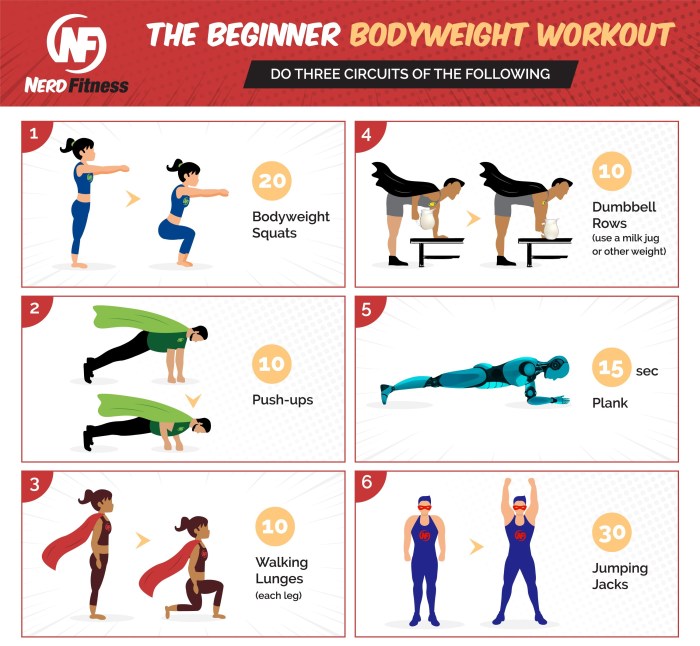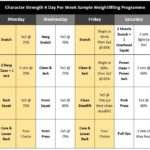The Best Weight Training Program isn’t a one-size-fits-all solution; it’s a deeply personalized journey shaped by individual goals, physical capabilities, and commitment. Whether you’re aiming for sculpted muscles, increased strength, or enhanced endurance, the path to success hinges on understanding your body’s unique needs and crafting a program that aligns perfectly with them. This guide delves into the science and art of weight training, offering a framework for building a program that delivers optimal results while minimizing the risk of injury.
From defining your objectives and selecting appropriate exercises to mastering proper form and tracking your progress, we’ll explore every facet of effective weight training. We’ll examine various training philosophies, providing practical examples and sample programs tailored to different fitness levels. Understanding the crucial role of nutrition and recovery will also be key, ensuring your body has the fuel and rest it needs to adapt and grow stronger.
Nutrition and Recovery for Optimal Results: The Best Weight Training Program

Optimizing your weight training program requires a holistic approach that extends beyond the gym. Nutritional intake and adequate recovery are critical for maximizing muscle growth, strength gains, and overall performance. Failing to prioritize these aspects can significantly hinder progress, leading to plateaus and potentially injury. This section details the crucial role of nutrition and recovery in achieving optimal results from your weight training regimen.
Macronutrient Roles in Muscle Growth and Recovery, The Best Weight Training Program
Protein, carbohydrates, and fats—the macronutrients—play distinct yet interconnected roles in muscle growth and recovery. Protein provides the building blocks for muscle repair and synthesis. Carbohydrates replenish glycogen stores depleted during training, fueling energy and preventing muscle breakdown. Healthy fats support hormone production and overall cellular function, contributing to a healthy metabolic environment conducive to muscle growth. A balanced intake of all three is essential for optimal results.
Insufficient protein intake will limit muscle protein synthesis, while inadequate carbohydrate consumption can impair recovery and lead to fatigue. A deficiency in healthy fats can disrupt hormonal balance, impacting both muscle growth and recovery processes.
Meal Plans for Varying Training Intensities and Goals
Dietary strategies should be tailored to individual training intensity and goals. For example, an athlete engaging in high-intensity training will require a higher caloric intake and greater carbohydrate consumption to replenish glycogen stores and support energy demands. Conversely, an individual focused on fat loss might prioritize a lower caloric intake with a higher protein intake to preserve muscle mass while promoting fat burning.A sample meal plan for a high-intensity training day might include a high-protein breakfast (e.g., oatmeal with protein powder and berries), a carbohydrate-rich lunch (e.g., chicken breast with brown rice and vegetables), and a post-workout snack containing both carbohydrates and protein (e.g., a protein shake with banana).
A lower-intensity training day or rest day could feature meals with slightly lower carbohydrate content and a focus on lean protein and healthy fats.
The Importance of Sleep, Hydration, and Stress Management
Recovery is not solely about nutrition; sleep, hydration, and stress management are equally vital. Adequate sleep (7-9 hours per night) allows the body to repair and rebuild muscle tissue. Dehydration impairs performance and recovery, so consistent hydration throughout the day is crucial. Chronic stress elevates cortisol levels, hindering muscle growth and potentially increasing the risk of injury.
Implementing stress-reduction techniques, such as meditation or yoga, can significantly improve recovery and overall well-being.
Recommended Daily Caloric Intake and Macronutrient Ratios
The following table provides a general guideline for daily caloric intake and macronutrient ratios. Individual needs may vary depending on factors such as age, sex, genetics, and training experience. Consult with a registered dietitian or sports nutritionist for personalized recommendations.
| Activity Level | Caloric Needs (Approximate) | Protein Ratio | Carbohydrate/Fat Ratio |
|---|---|---|---|
| Sedentary | 1500-1800 kcal | 15-20% | 50-60%/30-40% |
| Lightly Active | 1800-2200 kcal | 20-25% | 55-65%/25-35% |
| Moderately Active | 2200-2800 kcal | 25-30% | 60-70%/20-30% |
| Very Active | 2800-3500+ kcal | 30-35% | 65-75%/15-25% |
Ultimately, the best weight training program is the one you can consistently adhere to. It’s a journey of self-discovery, requiring patience, dedication, and a willingness to adapt your approach as your body changes and your goals evolve. By understanding the principles Artikeld in this guide – from proper form and progressive overload to nutrition and recovery – you’ll be well-equipped to craft a program that helps you achieve your fitness aspirations and maintain a healthy, active lifestyle for years to come.
Remember, consistency and smart planning are key to unlocking your full potential.

